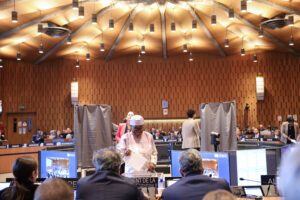
Culture, an invaluable tool which allows a distinctive connection between the past and present, is an integral part of development. It is a vehicle of social cohesion and environmental sustainability. UNESCO believes that sustainable development cannot be achieved without a strong cultural component- a human-centered approach based on mutual respect and open dialogue among cultures.
Nigeria, composed of 250 ethnic groups and 400 dialects has a rich cultural and natural heritage and the integration of these cultures into government policies is important for the nation’s development. The 1988 National Cultural Policy framework was established to emphasize the importance of culture as a foundation for nation building.
After the UNESCO Universal Declaration on Cultural Diversity in 2001, the Nigerian Federal Ministry of Tourism, Culture, and National Orientation began working in collaboration with UNESCO in 2003 to revise Nigeria’s cultural policy. The Declaration, stipulates that cultural policies should be revised every 10 years to take into account contemporary methods of safeguarding cultural heritage and promote culture as an important component of sustainable development.
UNESCO’s contribution to the field of culture in Nigeria includes promoting intercultural/interfaith dialogue and cultural diversity, preventing the illicit trafficking of cultural goods, protecting museums, safeguarding tangible and intangible heritage, capacity building, normative action, and protecting copyright.
In addition, Nigeria has worked in collaboration with UNESCO to establish two World Heritage sites, the Osun-Osogbo Sacred Grove and the Sukur Cultural Landscape. The former is the largest surviving sacred grove in Nigeria and an ancient site of worship that is still used to this day. The latter is an ancient settlement on a hilltop known for its terraced landscape and the Hidi Palace, the political and spiritual head of the settlement. Protecting these two sites is essential for preserving Nigeria’s culture as they are like a time capsule; they capture a picture of Nigeria’s cultural history.
Nigeria’s continued dedication to the revival and improvement of this sector, working hand in hand with UNESCO, has led to the following achievements:
- Ratification of all the UNESCO Cultural Conventions by the government of Nigeria;
- Rehabilitation of ancient museums, inscription of sites on the World Heritage list;
- Return of Cultural relics and artifacts from International Museums;
- Establishment of cultural industries in Nigeria for economic empowerment and revision of the National Policy on Culture;
- Establishment of a Category 2 Institute for the promotion of African cultures and dialogue, safeguarding the Ifa Divination System;
- Mapping and documentation of the slave routes in Nigeria for dialogue and remembrance of centuries of inhumanity that should not be allowed to happen again;
- The establishment of a National System of Living Human Treasures;
- Establishment of a UNESCO Chair in Cultural Heritage at the University of Port Harcourt;
- The establishment of an institute for museum and archaeological studies in Plateau State; and
- The establishment of the National Institute for Cultural Orientation.




